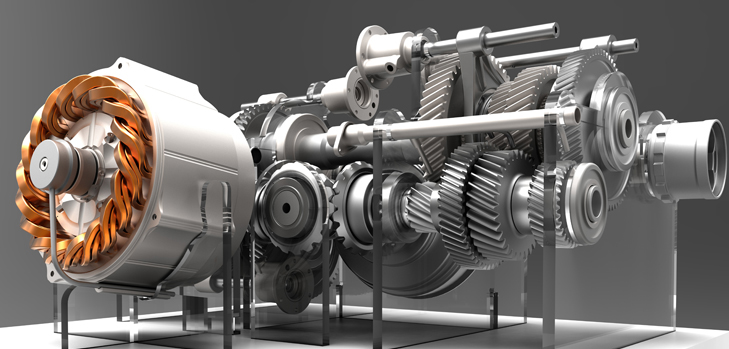Ricardo has shared its design for a novel e-motor, offering up to a 50% increase in power density compared with current production electric machines, as well as a new transverse DCT concept, which comes in a highly compact package and is easy to integrate with an e-motor in hybrid applications.
In July 2018, the company unveiled the new Ricardo 48V e-motor and accompanying inverter, which incorporate the latest thinking in high-performance, low-cost electrification, with the aim of offering the performance of 48V hybrids in a more affordable solution compared with today’s higher-voltage hybrids. The design and testing of this new 25kW, 48V e-motor and inverter was carried out as a part of the company’s contribution to the European COmpetitiveness in Commercial Hybrid and AutoMotive PowertrainS (ECOCHAMPS) project.
The new transverse DCT concept has been developed based on Ricardo’s experience in the design of supercar transmissions. The unit’s dual-clutch remains in line with the engine, while the two outputs drive high-speed bevel gearsets respectively delivering torque to the odd and even plus reverse gear sets. As configured, the Ricardo hybrid transverse DCT concept is approximately 37% shorter in length than its target/reference products, and offers better weight distribution, reduced vehicle polar moment of inertia, and ease of integration with an e-motor in a hybrid powertrain solution.
Details of the development of the six-phase, frameless, permanent magnet motor and its oil-cooled inverter with low thermal resistance have also been outlined in a research paper by the company. A focus of the paper is on the thermal management work, in particular reducing the thermal resistance – and hence improving the efficiency – of the inverter’s metal oxide semiconductor field effect transistor (MOSFET). The solution created is based on the use of direct oil cooling of the heat-sink using the same ATF as used to cool the e-motor. With its high performance and compact configuration, the e-motor and inverter combination is ideal for 48V hybrid applications.


